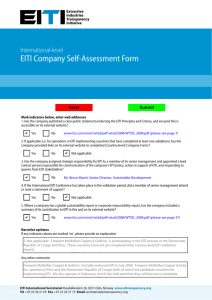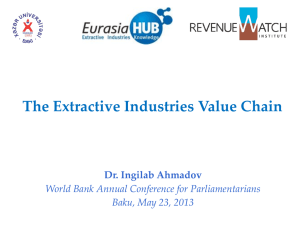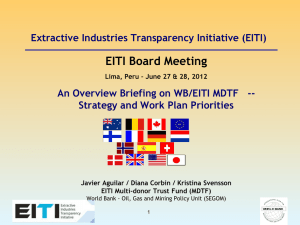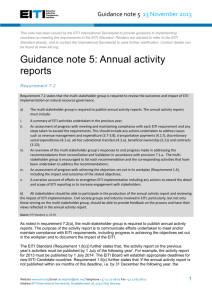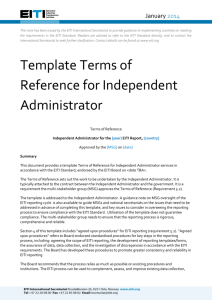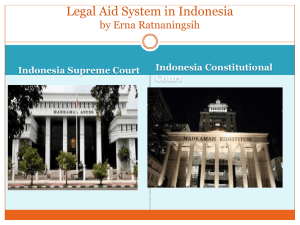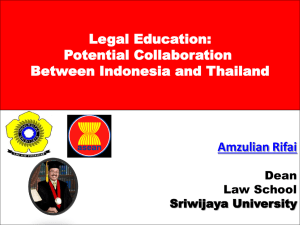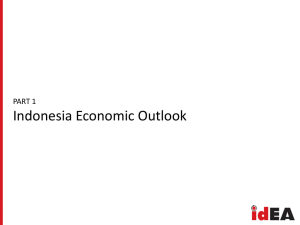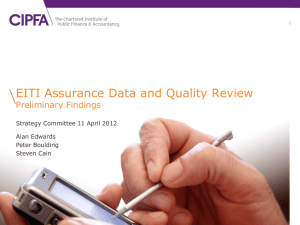EITI Implementation, Indonesian Initiative to Reform
advertisement
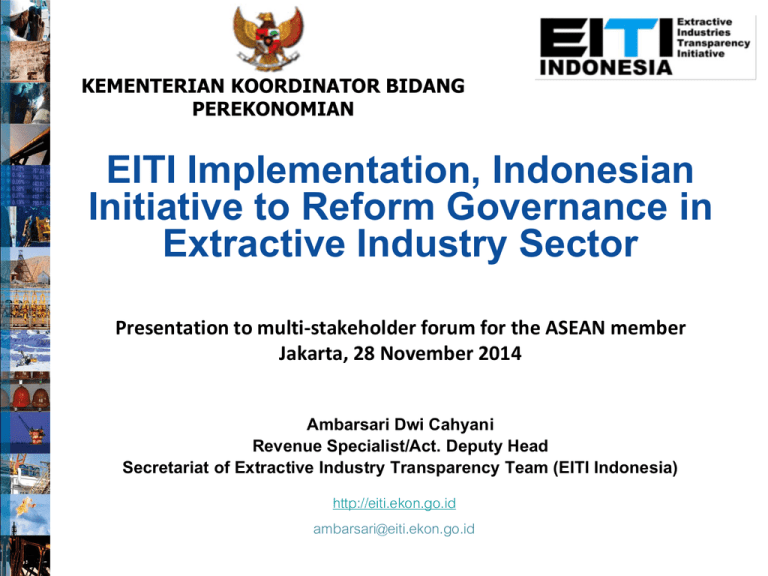
KEMENTERIAN KOORDINATOR BIDANG PEREKONOMIAN EITI Implementation, Indonesian Initiative to Reform Governance in Extractive Industry Sector Presentation to multi-stakeholder forum for the ASEAN member Jakarta, 28 November 2014 Ambarsari Dwi Cahyani Revenue Specialist/Act. Deputy Head Secretariat of Extractive Industry Transparency Team (EITI Indonesia) http://eiti.ekon.go.id ambarsari@eiti.ekon.go.id Introduction • In its ongoing fight against corruption, one cannot help considering that Indonesia will resist the idea that transparency is a powerful concept whose time has come. • Being a resource rich nation there has been perceptions that extractive industry firms are not transparent in declaring its production, its operational costs and its revenues. • CSO’s also noted the inconsistency of disclosed data on the industry • Indonesia’s position in the international corruption perception index is among the lowest. Background What is Indonesia’s Main Challenge as a Nation? (Kompas, 2010) Among the Most Corrupt Country? Source: Corruption Perception Index, Transparency International, 2010 Fights Against Corruption Repressive Measures • • • • Pre-investigation Investigation Prosecution Assets Tracing Public Trust Preventive Measures • • • • Bureaucracy reforms Wealth Declaration Transparency Whistleblower What is EITI? • • • A globally developed standard that promotes revenue transparency in the exploitation of non renewable energy resources at a local level. A voluntary coalition of government institutions, companies, civil societies, investors and international organizations. Principles should oversee that management and use of natural resources from the extractive industries for energy must be done in accordance with the principles of good governance, openness, sustainable development and the improvement of the investment climate. EITI Evolution 2003 2005 EITI Principles EITI Criteria and Sourcebook (non binding guidance) 2008 2011 2013 EITI Validation Guide (binding requirements) EITI Rules and Validation Guide EITI Standard EITI Requirements EITI Standar EITI Rules Companies Disclose Payments Licensing Government Discloses Receipt of Payments Transfers to local Information Production government Data Production Companies Government Budget Contract publish publish State Allocations (Encouraged)) Independent payments receipt Ownership State owned of TransitVerification payments Enterprises Beneficial (Encouraged) Tax & Company Royaltysocial ownership & infrastructure Payments (encouraged) A national multi-stakeholder group decides how their EITI process should work. Agrees EITI workplan with objectives linked to national priorities for the extractive sector. investment This Oversight group publishes by a an EITI Report where government Multi-Stakeholder revenuesGroup and other data are disclosed and independently assessed. The findings are analyzed and communicated to create public awareness and debate about how the country should better manage their resources. How is value captured? What information does the EITI capture? Revenue Collection Production Data Allocation of Rights What the EITI requires: Taxes & primary revenues(§4.2(a)) In-kind revenues(§4.1(c)) Infrastructure/ barter provisions(§4.1(d)) Transportation Revenues(§4.1(f)) What the EITI requires: Exploration activities (§3.3) Production volumes & values (§3.5(a) & §3.4(e)) Export volumes & values (§3.5(b)) Economic contribution (§3.4(a)-(c)) What the EITI requires: Legal framework & fiscal regime (§3.2 ) Register of licenses(§3.9) License award/transfer process & any deviations (§3.10) *Beneficial ownership (§3.11) *Contract/license disclosure(§3.12) SubNational What the EITI requires: Direct payments/receipts (§4.2(d)) Mandated sub-national transfers (§4.2(e)) SI Where do benefits go? What information does the EITI capture? What the EITI requires: Employment §3.4(d) Mandated social payments (§4.1(e)) Revenue Management What the EITI requires: Revenues recorded & not recorded in national budget (§3.7) *Earmarked revenues & budget/audit processes (§3.8) Why do countries sign for EITI? • Countries with non-renewable natural resources need to manage them in a way that generates economic growth, promotes welfare to the population and is environmentally sustainable. • To improve sovereign and corporate ratings and lower the investment risk • Consider the possibility to yield additionnal revenues through a review of past accounting practices • Platform for moving to a wider governance reform • Build a framework for collaboration and understanding between government, civil society and corporations. EITI Benefits to • COUNTRIES: economic and political stability and sends a positive signal to foreign investors by fostering sound, sustainable development and poverty reduction • COMPANIES: emergence of stable economic and political conditions an improved investment climate over the long term • CIVIL SOCIETY : Supports good governance, strengthens public institutions and raises public awareness. Helps to understand better the private sector and, consequently, improves its relations with it. Strengthens ties with investors and international organizations. • LOCAL COMMUNITIES: potentially receive a greater share of oil, gas and mining revenues. • STAKEHOLDERS : Create trust environment among stakeholders EITI Implementing Countries 48 EITI implementing countries, 30 compliant countries, 17 candidate countries (USA and UK join in 2014), 1 country suspended. Indonesia became compliant country in October 2014. Indonesia is the first EITI compliant country in ASEAN. Why did Indonesia file for EITI? (Presidential Regulation 26/2010) Considering: a. That the use of extractive resources, which are nonrenewable, should be done efficiently and effectively in order to advance general prosperity. b. That the management and use of natural resources must be done in accordance with the principles of good governance, including transparency, the inclusion of relevant stakeholders, openness, sustainable development, and the improvement of the investment climate. Challenges in Implementing EITI in Indonesia? • Participating parties need to understand better the benefit transparency brings to the country (question often asked …what’s in it for us?) • Decentralization laws give a lot of power to the regions. Communication with local levels is a must. • Companies and government institutions governed by rules and regulations that limit their liberty to disclose certain financial data. • Ultra nationalistic thinking that EITI would be used as an attempt by international institutions to control Indonesia’s natural resources. • Some thinking that transparency data could be misused for political purposes • After being admitted as a Compliant Country in October 2014, Indonesia has 3 years to go through the process for validation in accordance to the new EITI Standard. • Understanding and coordination within the Multi-Stakeholder Implementing Team is key to this success until the real EI good governance impacts appear at National and Local levels. The Indonesian MSG Meetings • Key activity to monitor EITI implementation in Indonesia • Leads by the Head of the Implementing Team (MSG) or who represents. • Decision making : consensus • At least every 3 months, held in the Coordinating Ministry for Economic Affairs office. EITI Indonesia Reports • The 1st Report (2009) was published in April 2013. • The 2nd Report (2010 and 2011) consist of Oil & Gas Sector (published in April 2014) and Mineral & Coal Sector were published in June 2014. • The 3rd Report (2012 and 2013) will be published in June 2015. The scoping study will be released in December 2014. Brief of the 2nd EITI Indonesia Report (2010-2011 Calender Years) Revenue Streams Oil and Gas Industry Government DG of Budget SKK Migas DG of Oil & Gas • Corporate & Dividend Tax (USD) • Production Bonus (USD) • Over/(Under) Lifting Oil&Gas (USD) Operator Partner • Total Lifting Oil (Barrels) & Gas (MSCF) • GOI Lifting Oil (Barrels) & Gas (MSCF) • DMO (Barrels) • DMO Fee (USD) • Over/(Under) Lifting Oil&Gas (USD) • Signature Bonus (USD) 71 reported 88 reported 11 no report Revenue Streams Mineral and Coal Industry Government DG of Mineral & Coal DG of Tax DG of Budget • Royalty • Sales Revenue Shares (Coal) • Income Tax • Dividend 74 reported 9 refused Reconciliation Result Oil and Gas Tax - Corporate & Dividen Tax 99% USD 9,1 USD 9,1 Non-tax - Prod. Bonus, Signature Bonus, DMO Fee, Over Under Lifting Oil & Gas 100% USD 13,1 USD 13,1 (in billions) 2 4 6 8 10 12 Reconciliation Govt Financial Statement 14 Reconciliation Result Mineral and Coal Tax – Income Tax 60% IDR 42,44 IDR 71,57 Non tax - Royalty and Sales Rev.shares IDR 21,32 90% IDR 23,98 (in trillions) 2 4 6 8 10 Reconciliation Govt Financial Statement 12 14 Lessons Importance of Speed • It has taken EITI Indonesia four years to get where it is. Could it have gone faster? • Governments have to realize that leadership of an Initiative requires not just a willingness to make important announcements, but also to take a thousand other small but necessary steps. • Multi stakeholders have to realize to follow up the recommendations for improving the governance, otherwise no real impacts appear on the ground. Communications • EITI is not a Stealth Initiative. It is a Public Initiative. • Therefore, communications is important. • The awareness of government, industry and civil society must be actively built through numerous workshops. • The press must be informed of relevant developments. • A communications strategy is vital. Conclusion • Bad governance means bad business. • Transparency ensures the access to information required for accountability and correction of performance. • Transparency provides information and insight needed to build trust and to address stakeholder's key concern about company business and performance. • Independent surveys show that a main impediment to new investment in the extractive industry in Indonesia is the lack of certainty with regards to tax and revenue issue. • Indonesia implements EITI, this would contribute to a more proper policy formulation and predictable business environment where new investments would take place.
